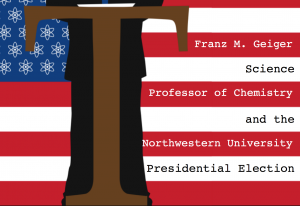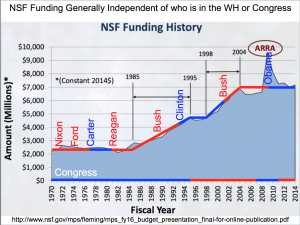
The 2016 National Election will have many consequences domestically and internationally. Yet, at least for the Nation’s largest supporter of basic fundamental research, the US National Science Foundation, funding tends to be largely independent of which party is in in the White House or in Congress, historical data shown in the graph below suggests.
A considerable problem for immediate and longer-term American science and innovation is the US Budget Sequestration (automatic lower domestic defense and non-defense spending by ca. $1.1 T/8 years), which will continue under the Republican leadership in the White House, the Congress, and the Senate. Continued sequestration translates into continued reductions of NSF funding by an estimated $300 to $400 M/a. With an estimated cost of $380,000 required for training a PhD student for four years on a federally funded grant at an institution with 54.5% overhead, like Northwestern University, the US is estimated to produce 4,000 to 6,00 fewer PhD students over the next four years lost because of sequestration cuts to the NSF alone. For comparison, 2014 showed a total of 54,000 research PhDs awarded by US institutions.
Given the strong to medium correlation between the American electorate’s party affiliation and opinions about wether government funding of basic science pays off that was recently reported by the Pew Research Center, other funders of US science, specifically those that are associated with a US cabinet position, such as the Department of Energy, the Department of Defense, and the National Institutes of Health, will almost certainly face major program-specific challenges and redirections.
To learn about possible fallouts for the prospects of science, innovation, engineering, the environment, and education stemming from this week’s events, sciencedebate dot org compiled this collection of reads:
Jeffrey Mervis | Science | Nov 09, 2016
Paul Raeburn | Newsweek | Nov 09, 2016
Chemical & Engineering News | Nov 09, 2016
Tereza Pultarova | Engineering & Technology Magazine | Nov 09, 2016
Andrew Revkin | New York Times | Nov 09, 2016
Danielle Muoio | Business Insider | Nov 09, 2016
